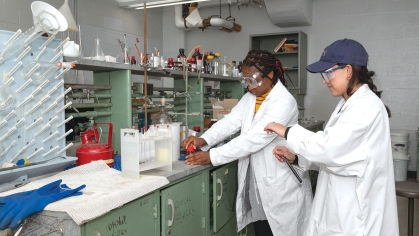Strategic Pillar #1
Innovation in Academic Excellence, Striving Toward Preeminence
Academic excellence is central to the identity of Rutgers University–Camden. To build on our foundation as an academic institution that affords opportunity to a diverse student body, we must strategically develop and grow programs that meet our students’ needs and expand our reach to populations not currently served. We accomplish this by expanding programs at all levels, developing non-traditional educational opportunities, and supporting curricular and programmatic innovation as well as student research.

Expand undergraduate, graduate, and professional programs
- Develop innovative cross-disciplinary programs within and between campus units as well as between chancellor-led units across the university.
- Identify opportunities for new and innovative programs that are responsive to current market demands and/or can address emerging national and international industry trends for academic disciplines.
Design and implement non-traditional educational opportunities/certifications
- Expand non-traditional certifications and engage with industry partners, government agencies, and non-profit organizations to develop skills-based certifications.
- Develop skill-based certificates that will expand access for historically excluded populations that could lead to future degree outcomes.
Deliver curricular/programmatic innovation in undergraduate education
- Increase the quantity of innovative engaged civic learning courses, experiential learning courses, and co-curricular experiences to enhance student engagement and improve student outcomes.
- Establish program evaluation processes to better update curricula and create more opportunities for innovation in academic program offerings.
- Develop a variety of degree completion modalities (accelerated, weekends, hybrid, etc.) to increase accessibility for a broader population of learners.
- Develop curricular approaches to increase students' awareness of career opportunities and help prepare them to gain employment with industry, government, and nonprofits upon graduating.
Develop greater faculty support for student research
- Develop an Undergraduate Student Research Center, a campus-wide coordinating entity that can (a) develop strategies to increase undergraduate research participation, (b) track campus-based funding opportunities and student participation in research opportunities, (c) develop faculty to successfully mentor diverse UG research students, and (d) match faculty to student researchers.
- Establish a fund to support faculty and students co-presenting at local, regional, national, and international conferences.
Five Strategic Pillars and Priorities